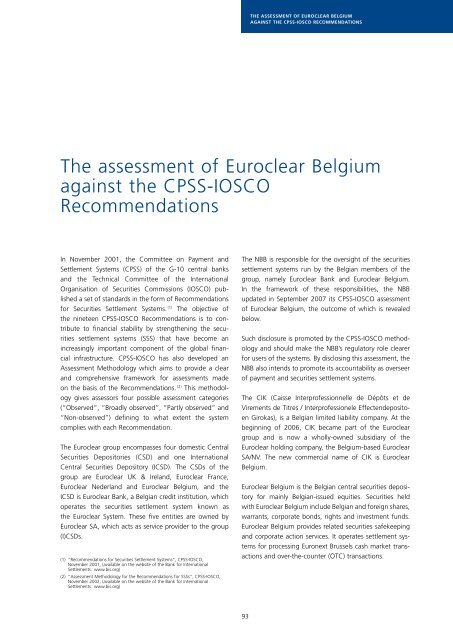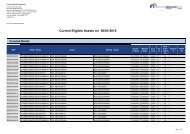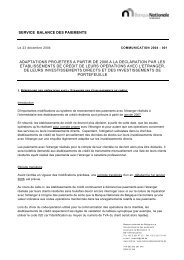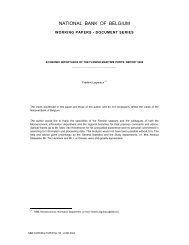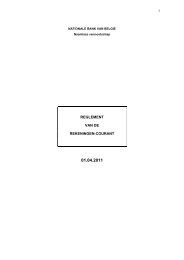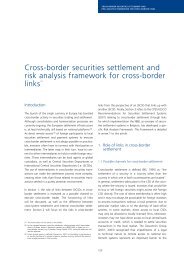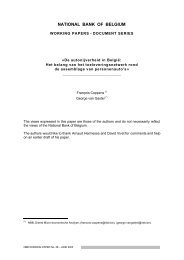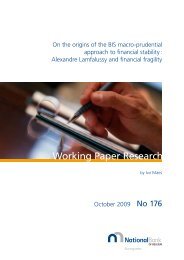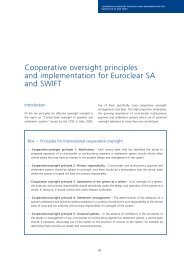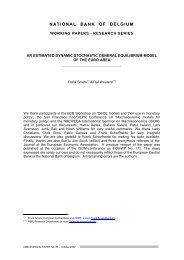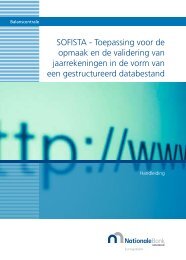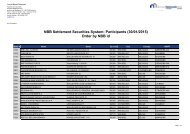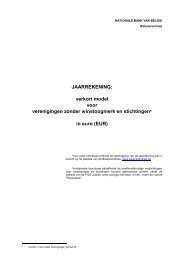The assessment of Euroclear Bank (ICSD)
The assessment of Euroclear Bank (ICSD)
The assessment of Euroclear Bank (ICSD)
Create successful ePaper yourself
Turn your PDF publications into a flip-book with our unique Google optimized e-Paper software.
<strong>The</strong> Assessment <strong>of</strong> <strong>Euroclear</strong> Belgiumagainst the CPSS-IOSCO Recommendations<strong>The</strong> <strong>assessment</strong> <strong>of</strong> <strong>Euroclear</strong> Belgiumagainst the CPSS-IOSCORecommendationsIn November 2001, the Committee on Payment andSettlement Systems (CPSS) <strong>of</strong> the G-10 central banksand the Technical Committee <strong>of</strong> the InternationalOrganisation <strong>of</strong> Securities Commissions (IOSCO) publisheda set <strong>of</strong> standards in the form <strong>of</strong> Recommendationsfor Securities Settlement Systems. (1) <strong>The</strong> objective <strong>of</strong>the nineteen CPSS‐IOSCO Recommendations is to contributeto financial stability by strengthening the securitiessettlement systems (SSS) that have become anincreasingly important component <strong>of</strong> the global financialinfrastructure. CPSS‐IOSCO has also developed anAssessment Methodology which aims to provide a clearand comprehensive framework for <strong>assessment</strong>s madeon the basis <strong>of</strong> the Recommendations. (2) This methodologygives assessors four possible <strong>assessment</strong> categories(“Observed”, “Broadly observed”, “Partly observed” and“Non-observed”) defining to what extent the systemcomplies with each Recommendation.<strong>The</strong> <strong>Euroclear</strong> group encompasses four domestic CentralSecurities Depositories (CSD) and one InternationalCentral Securities Depository (<strong>ICSD</strong>). <strong>The</strong> CSDs <strong>of</strong> thegroup are <strong>Euroclear</strong> UK & Ireland, <strong>Euroclear</strong> France,<strong>Euroclear</strong> Nederland and <strong>Euroclear</strong> Belgium, and the<strong>ICSD</strong> is <strong>Euroclear</strong> <strong>Bank</strong>, a Belgian credit institution, whichoperates the securities settlement system known asthe <strong>Euroclear</strong> System. <strong>The</strong>se five entities are owned by<strong>Euroclear</strong> SA, which acts as service provider to the group(I)CSDs.(1) “Recommendations for Securities Settlement Systems”, CPSS-IOSCO,November 2001, (available on the website <strong>of</strong> the <strong>Bank</strong> for InternationalSettlements : www.bis.org)(2) “Assessment Methodology for the Recommendations for SSSs”; CPSS-IOSCO,November 2002, (available on the website <strong>of</strong> the <strong>Bank</strong> for InternationalSettlements : www.bis.org)<strong>The</strong> NBB is responsible for the oversight <strong>of</strong> the securitiessettlement systems run by the Belgian members <strong>of</strong> thegroup, namely <strong>Euroclear</strong> <strong>Bank</strong> and <strong>Euroclear</strong> Belgium.In the framework <strong>of</strong> these responsibilities, the NBBupdated in September 2007 its CPSS‐IOSCO <strong>assessment</strong><strong>of</strong> <strong>Euroclear</strong> Belgium, the outcome <strong>of</strong> which is revealedbelow.Such disclosure is promoted by the CPSS‐IOSCO methodologyand should make the NBB’s regulatory role clearerfor users <strong>of</strong> the systems. By disclosing this <strong>assessment</strong>, theNBB also intends to promote its accountability as overseer<strong>of</strong> payment and securities settlement systems.<strong>The</strong> CIK (Caisse Interpr<strong>of</strong>essionnelle de Dépôts et deVirements de Titres / Interpr<strong>of</strong>essionele EffectendepositoenGirokas), is a Belgian limited liability company. At thebeginning <strong>of</strong> 2006, CIK became part <strong>of</strong> the <strong>Euroclear</strong>group and is now a wholly-owned subsidiary <strong>of</strong> the<strong>Euroclear</strong> holding company, the Belgium-based <strong>Euroclear</strong>SA/NV. <strong>The</strong> new commercial name <strong>of</strong> CIK is <strong>Euroclear</strong>Belgium.<strong>Euroclear</strong> Belgium is the Belgian central securities depositoryfor mainly Belgian-issued equities. Securities heldwith <strong>Euroclear</strong> Belgium include Belgian and foreign shares,warrants, corporate bonds, rights and investment funds.<strong>Euroclear</strong> Belgium provides related securities safekeepingand corporate action services. It operates settlement systemsfor processing Euronext Brussels cash market transactionsand over-the-counter (OTC) transactions.93
Box 1 – <strong>The</strong> CPSS-IOSCO Recommendations for SSSsI. Legal risk<strong>The</strong> legal framework applicable to an SSS’s operation is highly important for its reliability and predictability. Legalrisks may cause one party to a trade to suffer losses because laws or regulations do not support the rules <strong>of</strong> thesecurities settlement system or the property rights and other interests held through the settlement system.1. Legal frameworkSecurities settlement systems should have a well founded, clear and transparent legal basis in the relevantjurisdictions.II. Pre-settlement riskPre-settlement risk refers to the risk that an outstanding transaction for completion at a future date will not settlebecause one <strong>of</strong> the counterparties fails to perform on the contract or agreement during the life cycle <strong>of</strong> thetransaction before settlement. <strong>The</strong> resulting exposure is the cost <strong>of</strong> replacing the original transaction at currentmarket prices. This risk can be mitigated by trade confirmation mechanisms, shorter settlement cycles, the use <strong>of</strong>a central counterparty or the possibility to lend securities.2. Trade confirmationConfirmation <strong>of</strong> trades between direct market participants should occur as soon as possible after trade execution,but no later than trade date (T + 0). Where confirmation <strong>of</strong> trades by indirect market participants (such asinstitutional investors) is required, it should occur as soon as possible after trade execution, preferably on T + 0,but no later than T + 1.3. Settlement cyclesRolling settlement should be adopted in all securities markets. Final settlement should occur no later than T + 3.<strong>The</strong> benefits and costs <strong>of</strong> a settlement cycle shorter than T + 3 should be evaluated.4. Central counterparties (CCPs)<strong>The</strong> benefits and costs <strong>of</strong> a CCP should be evaluated. Where such a mechanism is introduced, the CCP shouldrigorously control the risks it assumes.5. Securities lendingSecurities lending and borrowing (or repurchase agreements and other economically equivalent transactions)should be encouraged as a method for expediting the settlement <strong>of</strong> securities transactions. Barriers that inhibitthe practice <strong>of</strong> lending securities for this purpose should be removed.III. Settlement riskSettlement risk is a general term used to designate the risk that settlement in a SSS will not take place as expected,e.g. because a party will default on one or more settlement obligations to its counterparties or to a settlementagent.494
VI. Other issues13. GovernanceGovernance arrangements for CSDs and CCPs should be designed to fulfil public interest requirements and topromote the objectives <strong>of</strong> owners and users.14. AccessCSDs and CCPs should have objective and publicly disclosed criteria for participation that permit fair and openaccess.15. EfficiencyWhile maintaining safe and secure operations, securities settlement systems should be cost-effective in meetingthe requirements <strong>of</strong> users.16. Communication procedures and standardsSecurities settlement systems should use or accommodate the relevant international communication proceduresand standards in order to facilitate efficient settlement <strong>of</strong> cross-border transactions.17. TransparencyCSDs and CCPs should provide market participants with sufficient information for them to identify and evaluateaccurately the risks and costs associated with using the CSD or CCP services.18. Regulation and oversightSecurities settlement systems should be subject to transparent and effective regulation and oversight. Centralbanks and securities regulators should cooperate with each other and with other relevant authorities.19. Risks in cross-border linksCSDs that establish links to settle cross-border trades should design and operate such links to reduce effectivelythe risks associated with cross-border settlements.<strong>The</strong> results <strong>of</strong> this <strong>assessment</strong> <strong>of</strong> <strong>Euroclear</strong> Belgium aresummarised in Table 2. This <strong>assessment</strong> takes into accounta series <strong>of</strong> mitigating actions that were taken by <strong>Euroclear</strong>Belgium after the preliminary <strong>assessment</strong> made by theNBB. As a result, <strong>Euroclear</strong> Belgium is now fully compliantwith fifteen recommendations, whereas three recommendations(7, 12 and 19) are “broadly observed”. Onerecommendation (3) is considered irrelevant for <strong>Euroclear</strong>Belgium since it deals with aspects <strong>of</strong> the settlement cyclefor which <strong>Euroclear</strong> Belgium cannot be held accountable.<strong>The</strong> legal framework supports the enforceability <strong>of</strong> transactionsand the protection <strong>of</strong> participants’ assets. Italso provides an adequate legal basis for the holding<strong>of</strong> securities (immobilisation and dematerialisation), thetransfer <strong>of</strong> securities by book entry, securities lending anddelivery versus payment with finality. <strong>The</strong> system’s rulesand contracts are considered enforceable between participants,notwithstanding the insolvency <strong>of</strong> a participant.Recommendation 1 (legal framework) is observed.Legal risk<strong>The</strong> settlement activities <strong>of</strong> the <strong>Euroclear</strong> Belgium systemsare governed by consistent, clear and solid laws, rules,procedures and contractual provisions that are public andaccessible to system participants.Pre-settlement risk<strong>Euroclear</strong> Belgium’s systems settle Euronext Brusselsstock exchange transactions and over-the-counter trades.Rules and practices regarding trade confirmation andsettlement cycles are set by the market itself. In practice,<strong>Euroclear</strong> Belgium cannot interfere with these rules andpractices. Settlement instructions are matched prior to96
<strong>The</strong> Assessment <strong>of</strong> <strong>Euroclear</strong> Belgiumagainst the CPSS-IOSCO RecommendationsSUMMARY OF THE RESULTS OF THE ASSESSMENT OF EUROCLEAR BELGIUM AGAINST CPSS-IOSCO RECOMMENDATIONSRecommendationAssessment categoryI. Legal riskRecommendation 1 Legal framework ObservedII. Pre-settlement riskRecommendation 2 Trade confirmation ObservedRecommendation 3 Settlement cycles Not relevantRecommendation 4 Central counterparties (CCPs) ObservedRecommendation 5 Securities lending ObservedIII. Settlement riskRecommendation 6 Central securities depositories (CSDs) ObservedRecommendation 7 Delivery versus payment (DVP) Broadly observedRecommendation 8 Timing <strong>of</strong> settlement finality ObservedRecommendation 9 CSD risk controls to address participants’ failures to settle ObservedRecommendation 10 Cash settlement assets ObservedI V. Operational riskRecommendation 11 Operational reliability ObservedV. Custody riskRecommendation 12 Protection <strong>of</strong> customers’ securities Broadly observedVI. Other issuesRecommendation 13 Governance ObservedRecommendation 14 Access ObservedRecommendation 15 Efficiency ObservedRecommendation 16 Communication procedures and standards ObservedRecommendation 17 Transparency ObservedRecommendation 18 Regulation and oversight ObservedRecommendation 19 Risks in cross-border links Broadly observedsettlement. Recommendation 2 (trade confirmation) isobserved.Recommendation 3 (settlement cycles) stipulates thatsettlement fails should not be a significant source <strong>of</strong>added risk but, if so, risks from fails should be effectivelymitigated. For over-the-counter trades, the fails rateexceeds 5 p.c. <strong>of</strong> settlements and can thus be consideredas a source <strong>of</strong> risk. No information is available regardingrisk mitigation measures as these take place bilaterallybetween the transaction participants. <strong>The</strong> NBB acknowledgesthat the risk mitigation techniques for coping withfails are bilaterally agreed between the counterparties tothe over-the-counter transaction. Recommendation 3 isthus not relevant for <strong>Euroclear</strong> Belgium.Recommendation 4 (central counterparties) requires theevaluation <strong>of</strong> the costs and benefits <strong>of</strong> a central counterparty(CCP) or the introduction <strong>of</strong> a CCP mechanism.For Euronext Brussels trades, when the transaction isregistered, the Paris-based clearing house LCH.ClearnetSA positions itself as a CCP between the clearing member<strong>of</strong> the buyer and the clearing member <strong>of</strong> the seller. <strong>The</strong>recommendation is being observed.Recommendation 5 on securities lending stipulates thatthere should be no impediments to the development andfunctioning <strong>of</strong> securities lending. Securities lending helpsto expedite settlement. Securities lending in Belgian stockshas recently become more efficient with a widening <strong>of</strong> thelending base. In July 2004, a law was passed allowing97
Belgian funds to lend stocks, pending the implementingRoyal Decree. In March 2006, this Royal Decree enteredinto force enabling Belgian funds to lend stocks to creditinstitutions, investment firms and clearing and settlementinstitutions. Recommendation 5 is observed.Settlement riskCPSS-IOSCO Recommendation 6 (CSDs) requires the SSSto provide immobilisation or dematerialisation <strong>of</strong> securitiesand to process transfers by book entry. In Belgium, adematerialisation conversion project is being implementedfrom 2008 onwards, discouraging investors from holdingsecurities in paper form. <strong>Euroclear</strong> Belgium complies withthis requirement.Recommendation 7 requires a DVP mechanism so asto avoid principal risk when counterparties settle atrade. In principle, <strong>Euroclear</strong> Belgium provides provenDVP arrangements. However, the <strong>Euroclear</strong> Belgiumtechnical and contractual framework does not alwaysensure DVP, as – under specific circumstances, e.g. inthe unlikely event that the CCP LCH.Clearnet SA woulddefault – the <strong>Euroclear</strong> Belgium participant selling securitieson exchange does not always benefit from such amechanism vis-à-vis LCH.Clearnet SA. Furthermore, theavailable data for over-the-counter transactions indicatethat around 20 p.c. <strong>of</strong> over-the-counter trades might notbe settled DVP. <strong>The</strong>refore, Recommendation 7 is assessedas being broadly observed. <strong>The</strong> NBB recommends thatwithin the relevant <strong>Euroclear</strong> Belgium settlement system,the CCP LCH.Clearnet SA is regarded as the same as anyother participant in the sense that a DVP mechanism isalways applied for trades settled between the CCP andall relevant <strong>Euroclear</strong> Belgium participants. <strong>The</strong> NBBacknowledges that the planned new settlement system(ESES), due to be implemented by <strong>Euroclear</strong> in Belgium inNovember 2008, will remedy this problem. Pending thissolution, the NBB recommends that <strong>Euroclear</strong> Belgiumamend its legal documentation so as to increase transparencyon the potential risk a net seller incurs vis-à-visthe CCP in the event <strong>of</strong> a CCP default. It is furthermorerecommended that the reasons for the assumed relativelyhigh number <strong>of</strong> over-the-counter trades that are not settledDVP are determined and – where appropriate – thecause removed, except where it is the own free will <strong>of</strong> theparties to settle Free <strong>of</strong> Payment (FoP).Regarding Recommendation 8 (timing <strong>of</strong> settlement finality),the moment <strong>of</strong> finality is stipulated in the <strong>Euroclear</strong>Belgium legal documentation. <strong>The</strong> system complies withthis recommendation.<strong>Euroclear</strong> Belgium does not <strong>of</strong>fer cash accounts to itsparticipants. <strong>The</strong> cash accounts <strong>of</strong> the systems operatedby <strong>Euroclear</strong> Belgium are held at the NBB, which acts asthe settlement agent for the <strong>Euroclear</strong> Belgium systemparticipants. <strong>The</strong> cash leg <strong>of</strong> the transactions processedby <strong>Euroclear</strong> Belgium is thus settled in central bankmoney. Cash settlement is exclusively in euro. Overdraftsor debit balances in securities are not permitted in thesystem. Recommendation 9 (CSD risk controls to addressparticipants’ failures to settle) and Recommendation 10(cash settlement assets) are therefore assessed as beingobserved.Operational risk<strong>Euroclear</strong> Belgium has outsourced its IT operations to anexternal service provider, Atos Euronext Market Solutions(AEMS), under a framework agreement concluded via<strong>Euroclear</strong> SA/NV. In accordance with the <strong>Euroclear</strong> groupoutsourcing policy, <strong>Euroclear</strong> Belgium remains responsibleas the operator <strong>of</strong> the custody and settlement systemand exerts adequate control over the IT service provider.Recommendation 11 on operational reliability specificallyrequires all key systems to have appropriate contingencyplans and backup facilities, and to be reviewed regularly.A Disaster Recovery Plan (DRP) covering IT infrastructurefor key systems has been put in place and will run atanother location sufficiently far away from the main sitewhenever needed. A business contingency plan has beendrawn up. Recommendation 11 further requires a systemoperator, such as <strong>Euroclear</strong> Belgium, that outsourcesoperations to a third party to make sure that those operationsmeet the same standards as if they were provideddirectly. <strong>The</strong> system operator and AEMS have identifiedthe sources <strong>of</strong> operational risk and established related policies,so as to ensure that there are <strong>of</strong>ficial and adequatemanagement controls up to the level <strong>of</strong> the final provider<strong>of</strong> the outsourced service. <strong>The</strong>refore, Recommendation 11is being observed too.Custody riskRecommendation 12 (protection <strong>of</strong> customers’ securities)requires the use <strong>of</strong> adequate accounting practices andsafekeeping procedures. <strong>The</strong> vast majority <strong>of</strong> the securitiesdeposited and immobilised with <strong>Euroclear</strong> Belgium arephysical securities that are kept in the vaults <strong>of</strong> <strong>Euroclear</strong>Belgium. Within <strong>Euroclear</strong> Belgium, risk controls are inplace and procedures are subject to internal audit checks.<strong>Euroclear</strong> Belgium enables participants to distinguishbetween their own and their clients’ securities, whichprotects customers’ securities from a participant’s insol-98
<strong>The</strong> Assessment <strong>of</strong> <strong>Euroclear</strong> Belgiumagainst the CPSS-IOSCO Recommendationsvency. <strong>Euroclear</strong> Belgium has never experienced any case<strong>of</strong> insufficient securities to meet any customer claim. Also,participants – including foreign CSDs – receive accountstatements each time a securities transfer takes place, statingthe transfer and the position <strong>of</strong> the securities involved.However, an account statement listing all the participant’ssecurities positions is only sent once a year. Moreover,<strong>Euroclear</strong> Belgium can “print on demand” book-entrysecurities when an investor wants to hold this security inphysical form, thanks to a Belgian law enabling this servicewhich came into force in February 2006. When immobilisedand held on account with CIK, these securities arerepresented by a specific global note form. <strong>The</strong> face valueor capital share <strong>of</strong> this global note can be determined, asrequired by law, on the basis <strong>of</strong> the books and inventoriesheld by <strong>Euroclear</strong> Belgium upon the instructions <strong>of</strong> its participantsand the issuer. <strong>The</strong> <strong>Euroclear</strong> Belgium contractualframework has been adapted to specify all proceduresinvolved regarding these “print-on-demand” securities.However, there is no reconciliation procedure for regularlyconfirming with the issuer the accuracy <strong>of</strong> the face value<strong>of</strong> this specific global note form.Based on the above, Recommendation 12 (custody Risk) isassessed as being broadly observed. <strong>The</strong> NBB recommendsthat <strong>Euroclear</strong> Belgium regularly sends its participants anaccount statement listing all their securities positions andasking for any discrepancies to be reported. <strong>The</strong> NBBalso recommends that <strong>Euroclear</strong> Belgium puts together areconciliation procedure with the issuer so as to regularlycheck that the face value <strong>of</strong> the specific “printing-ondemand”global note form is correct.Other issuesGovernanceAccessRecommendation 14 (access) stipulates that access criteriamust be objective, clearly stated and publicly disclosed.Criteria that limit access to the CSD on grounds other thanrisks should be avoided. <strong>Euroclear</strong> Belgium has drawn upobjective and risk-based access criteria. It has stipulatedthem in its contractual framework that is published on itswebsite. <strong>The</strong> recommendation is therefore observed.Efficiency<strong>Euroclear</strong> Belgium has put in place procedures to regularlyreview its pricing levels against its operational costs. Usermeetings are frequently held in order to improve services,whenever requested.Users are systematically informed <strong>of</strong> all new plannedproducts, the pricing structure and tariff changes. Regularand ad hoc user groups have been formed where usersare involved in outlining the business cases for projectscomprising a functional description and cost and priceanalysis. Recommendation 15 (efficiency) is observed.Communication procedures and standards<strong>Euroclear</strong> Belgium uses international communicationstandards and procedures. Besides its own proprietarysystem, the CSD <strong>of</strong>fers file transfer facilities and SWIFTISO15022. Links with other CSDs are SWIFT-based. Usershave different possibilities for connecting to the CSDand there is a wide range <strong>of</strong> possibilities as to the kind<strong>of</strong> reporting they want to receive, the frequency and themeans <strong>of</strong> communication : SWIFT (ISO15022), Satelit (aproprietary system based on a specific s<strong>of</strong>tware) or filetransfer. Recommendation 16 (communication proceduresand standards) is observed.In 2006, <strong>Euroclear</strong> Belgium became part <strong>of</strong> the <strong>Euroclear</strong>group and is now a wholly-owned subsidiary <strong>of</strong> the<strong>Euroclear</strong> holding company, called <strong>Euroclear</strong> SA/NV, establishedin Belgium. <strong>Euroclear</strong> SA/NV <strong>of</strong>fers a broad range<strong>of</strong> services to <strong>Euroclear</strong> Belgium, as to the group’s otherSSSs. <strong>The</strong>se include audit, financial and risk management,legal, human resources, product management, businessmodel and harmonisation services. However, the group’s(I)CSDs remain separate legal entities subject to their existingregulatory environment.Both the <strong>Euroclear</strong> Belgium and the <strong>Euroclear</strong> SA/NV governancearrangements are clearly specified and informationabout them is publicly available. Established user committeesdo take users’ interests into account. Consequently,Recommendation 13 (governance) is observed.TransparencyRecommendation 17 on transparency requires market participantsto be provided with a full and clear description<strong>of</strong> their rights and obligations, the cost <strong>of</strong> participatingin the system, the rules, regulations and laws governingthe system, its governance procedures, any risks arisingeither for participants or for the operator, and any stepstaken to mitigate those risks. It further stipulates thatthe CPSS/IOSCO Disclosure Framework or the answersto the key questions <strong>of</strong> this <strong>assessment</strong> report should becompleted and disclosed. <strong>Euroclear</strong> Belgium has coordinatedall relevant contractual and technical documentation.It is available in French and Dutch and is publishedon the <strong>Euroclear</strong> Belgium website. Since October 2006,<strong>Euroclear</strong> Belgium has published on its website answers99
to the ECSDA disclosure questionnaire which incorporatesquestions from the CPSS‐IOSCO disclosure framework.Recommendation 17 is observed.Regulation and oversightAs a securities settlement system, <strong>Euroclear</strong> Belgium isoverseen by the National <strong>Bank</strong> <strong>of</strong> Belgium. <strong>Euroclear</strong>Belgium has the status <strong>of</strong> settlement institution and, inthis respect, is subject to prudential supervision by theCBFA. <strong>The</strong> roles and tasks <strong>of</strong> the CBFA and the NBB,and their cooperation, are clearly defined in the relevantlaws and regulations on the supervision <strong>of</strong> the financialmarkets. Recommendation 18 (Regulation and oversight)is observed.Risks in cross-border linksRecommendation 19 (risks in cross-border links) statesthat CSDs that establish links to settle cross-border tradesshould design and operate such links to effectively reducethe risks associated with cross-border settlements. It prescribesa risk <strong>assessment</strong> <strong>of</strong> the link. <strong>Euroclear</strong> Belgiumhas established a scheme for regular self-<strong>assessment</strong>s <strong>of</strong>its link arrangements. However, it has not yet used thisformal risk-<strong>assessment</strong> procedure for analysing the design<strong>of</strong> each link. <strong>The</strong>refore, the recommendation is onlybroadly observed. <strong>The</strong> NBB recommends that <strong>Euroclear</strong>Belgium applies its risk analysis to the relevant legal,operational and financial aspects <strong>of</strong> each link.100


